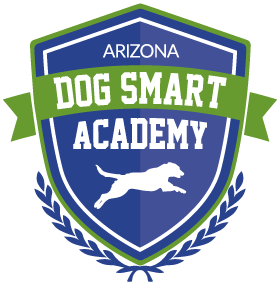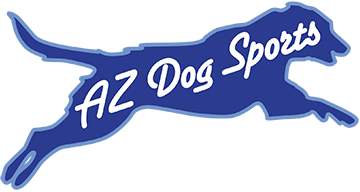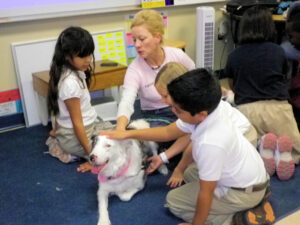 Would you like your puppy to be a Therapy Dog one day?
Would you like your puppy to be a Therapy Dog one day?
As a Therapy Dog Team tester for Alliance of Therapy Dogs there are many characteristics we look for in a well-rounded, socialized, stable dog. Socializing your puppy from the start will set the ground work for you.
The crucial time to socialize your puppy is between 3 to 12 weeks of age. During this time your puppy is open to new situations with a free and open mind. This will lay the foundation for a well socialized puppy. Keep in mind that your puppy won’t be fully vaccinated during this time so take all the precautions to maintain their health and safety.
Your socialization does not stop at the 12-week mark, it is an ongoing process as your puppy develops and ages.
Socializing does not just mean other dogs and people, it includes; noises/sounds low and high pitch, smells, many different textures your puppy will touch, activities that your puppy does and temperature changes. You will also want to handle your puppy. This means touching her ears, nose, mouth, paws, nails, tail and holding her in different positions. Your puppy will need to feel comfortable riding in a car, and when at all possible riding in a secure safe crate is the best option.
For most Therapy Dog Organizations your dog is not eligible to test until 1 year of age. This gives you an entire year to prepare for your endeavor with you and your dog to become a good Therapy Team.
What Therapy Dog Organizations Look For in a Future Therapy Dog:
Well Socialized Dog
A Therapy dog will need to be comfortable in many settings.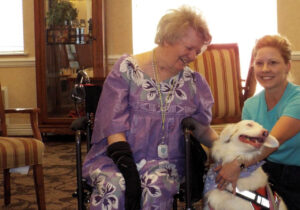
- In an Assisted Living home you and your dog will meet residents that walk with canes, walkers or ride in wheel chairs. Having your dog comfortable around these objects is necessary so that they do not react in a fearful way or with avoidance to them.
- In an airport setting your dog will be exposed to large moving crowds of people, loud noises, large moving objects, luggage, luggage transport carts, and security carts. Making sure your dog can walk alongside loud moving objects is a must for airport therapy work.
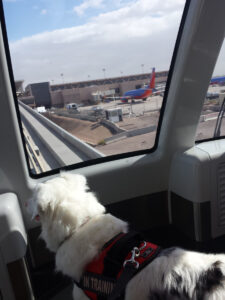
- In an Educational setting your dog will meet students from as young as 3 years old to college aged young adults. This could be at a school, seminar or library. There is a lot of opportunity to do therapy work in these settings. Making sure your dog can be petted by multiple people at once in smaller spaces in necessary for this type of work.
- In a hospital or skilled nursing setting your dog will be around medical equipment, medical beds and many hospital staff members. Your dog will need to be ok with loud noises and moving together as a tight team when walking through halls and rooms. You will have to make sure your dog does not jump up, paw or lick and can sit nice and still while doing visits with the sick, injured and recovering persons.
Obedience and Team Work
As a Therapy Dog team, you will need more than just basic obedience skills of sit, down, stay and come. You need to count on your dog to be consistent and follow your commands and directions. There must be trust between you and your dog. You will be asking your dog to walk into situations and meet strangers in various settings. This means you will have to practice all your commands in various settings to get the consistency you need to rely on.
Your dog must learn “leave it”, which will make sure that your dog does not pass by and pick up every interesting item they see. You don’t want them picking up fallen medications, or trash or objects that can be harmful to them when doing your work together.
You will need to teach “visit”; which will have your dog either sitting, standing or lying down to visit with people. This requires your dog to be patient and stay in place for several minutes at a time while meeting people at a facility. Depending on the type of therapy work you choose you will be asking your dog to visit with individuals in multiple positions.
Canine to Canine Interaction
Your dog will need proper manners when entering a facility and remain quiet. They cannot enter a facility barking or barking when seeing another dog. A Therapy Dog cannot lunge at or act aggressively towards another dog they see or pass by. Your dog will need to show impulse control when seeing other dogs. Exposure and proper socialization with other dogs are very important as your puppy grows up.
Health and Appearance
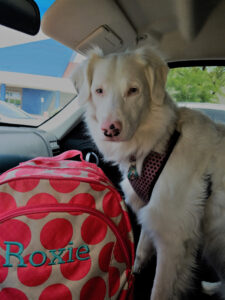
It is expected that your therapy dog will maintain proper health records.
This means an annual wellness visit with your veterinarian and proper vaccinations must be up to date. Most Therapy Dog Organizations will require one wellness exam per year, current rabies vaccination or blood titer with proper results, and a negative fecal test. The fecal test will rule out a parasite your dog may have.
You and your dog both need to have a clean and appropriate appearance when doing therapy dog visits. Your dog will be groomed, clean and brushed nicely. You will dress appropriately wearing closed toe shoes when doing any type of medical, hospital, skilled nursing or hospital visits. You need to remember you are a working team with your dog and need to dress appropriately as a handler. This means the ability to move quickly out of the way, walk on many types of surfaces and bending or lifting with your dog.
Willingness to Perform Visitations
After all you have done to prepare your puppy throughout the year to become a well-rounded therapy dog, they still must “want” to do it as well.
This means they must be willing to visit with strangers. Your dog needs to enjoy going up to multiple people for generally a one-hour time period and be petted repeatedly. Your dog might be required to sit or lay down for 15 to 30 minutes at a time if they participate in a reading group for children. In the end, it is not just you that has to have the desire for this work, your dog must have it to.
Preparing your dog from the beginning is the key to the best success!
Therapy Dog Classes
At AZ Dog Sports, Julie Brewer teaches Therapy Dog Classes on different levels.
Therapy Dog Level I
This class is the best choice for a dog and handler just starting out on their endeavor to become a pet therapy team. This class will introduce you and your dog to being around medical equipment, medical setting noises, the proper way to enter a facility, greet individuals and do pet therapy visits. We will cover all the necessary items to take a test to become an official pet therapy team. Julie is an official tester for Alliance of Therapy Dogs and will be able to arrange for you to take the certification test once you are ready to move forward.
Therapy Dog Level II
This class is for a more advanced team looking to refine their skills. In Level II class you will be given creative ideas and instructions on ways to make your therapy visits more meaningful. There are many activities you and your dog can do and share with others while on visits. We will go over what it is to be a READ Dog and how to do reading visits with children. This class will also include Airport Pet Therapy skills going over airport items and sounds your dog will encounter. We will provide you with the information and skills it will take to join Sky Harbor Navigator Buddies Program.
Pet Etiquette Class
This class is also a good choice for those interested in Therapy Dog Work. This class meets at a different location each week at indoor locations out in the community practicing their skills greeting people and demonstrating proper public manners. Some of the places we go to are; Assisted Living, Libraries, College Campuses, Airports, and Restaurant Patios.

